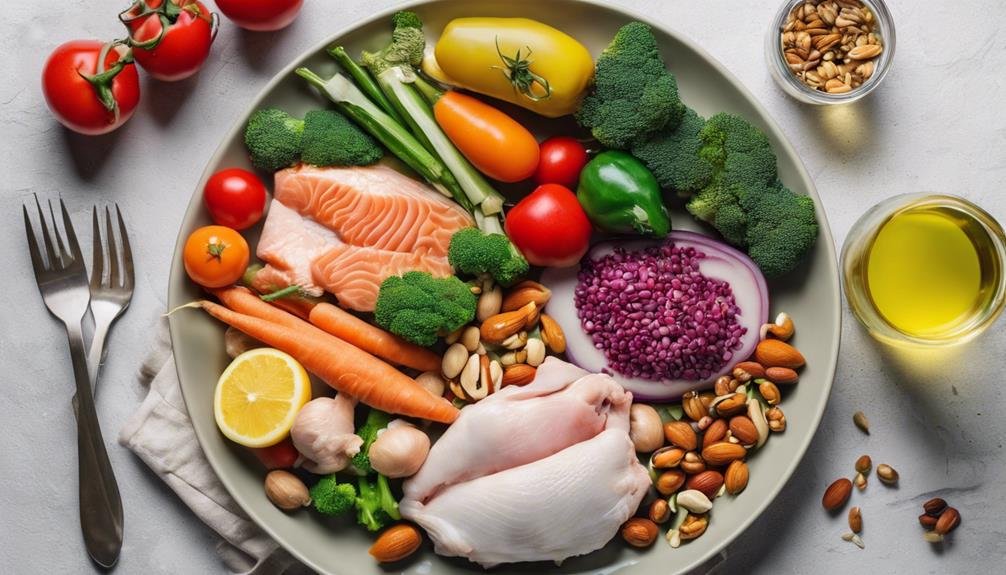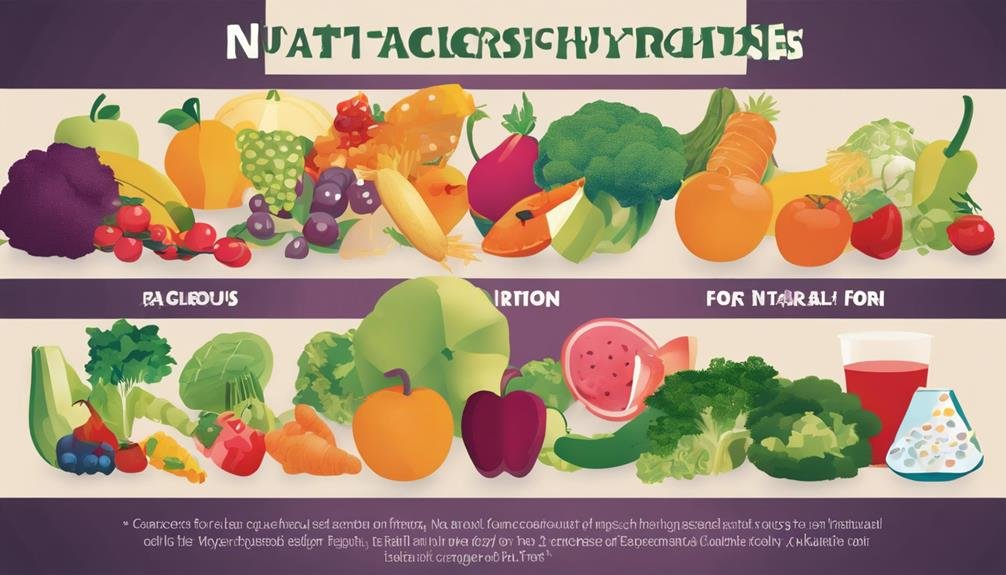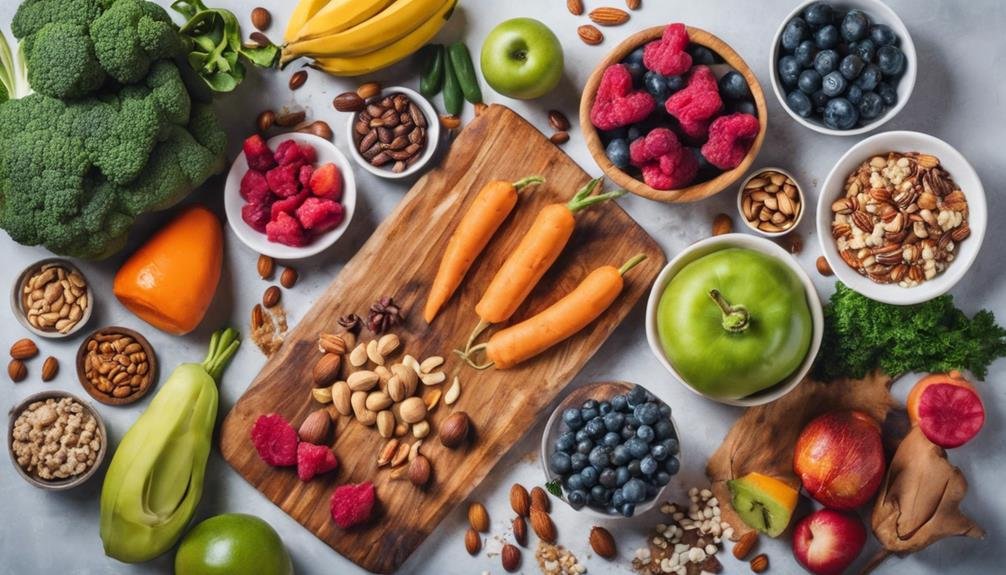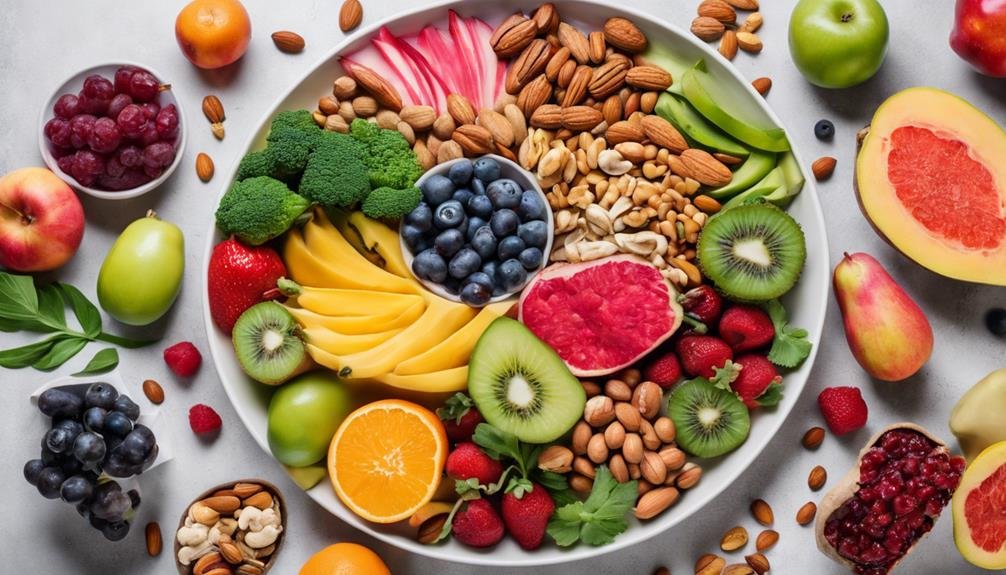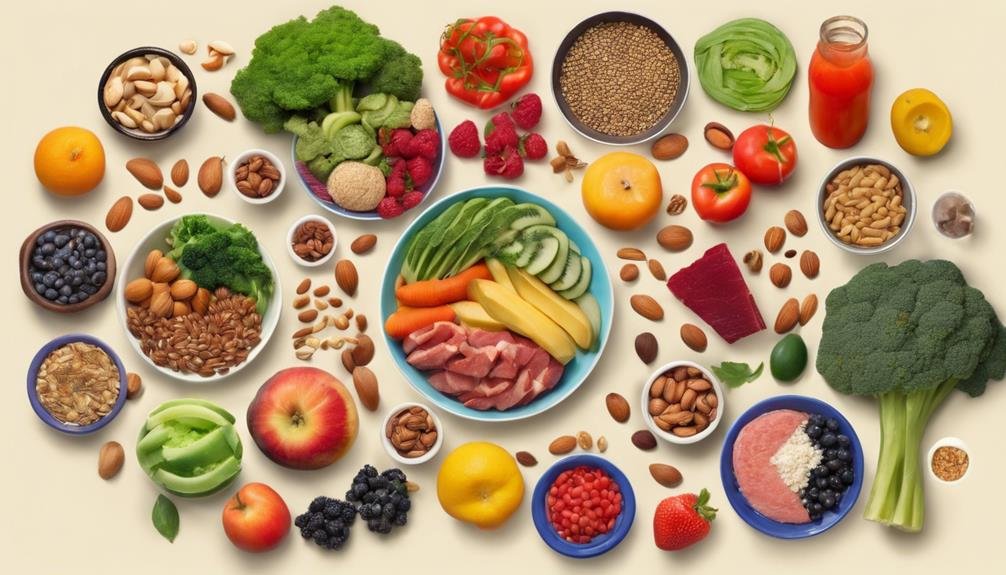Have you ever considered the impact of your diet on cancer prevention? The connection between nutrition and reducing cancer risk is a compelling topic that warrants exploration. When it comes to cancer prevention, the role of a whole-food Paleo diet in promoting overall health and well-being cannot be overlooked. This dietary approach offers a myriad of benefits that go beyond weight management and may hold the key to supporting your body's defense mechanisms against cancer.
Origins of the Paleo Diet
When delving into the origins of the Paleo Diet, it's essential to understand its foundations in our ancestors' eating habits.
The Paleo Diet, also known as the caveman diet, is centered around consuming whole, unprocessed foods that mimic what our hunter-gatherer ancestors would have eaten. This includes lean meats, fish, fruits, vegetables, nuts, and seeds while excluding grains, dairy, and processed foods.
The philosophy behind the Paleo Diet is based on the belief that our bodies are best adapted to the diet of our Paleolithic ancestors, which consisted of foods that could be hunted or gathered.
Understanding Cancer Development
Exploring the relationship between diet and health inevitably leads us to consider how our food choices may impact the development of diseases like cancer. Cancer development is a complex process influenced by various factors, including genetic predisposition, environmental exposures, and lifestyle choices. Cancer begins when cells in the body start to grow uncontrollably, forming tumors that can invade surrounding tissues and spread to other parts of the body.
Understanding cancer development involves recognizing that certain dietary patterns can either promote or inhibit this process. For instance, a diet rich in whole foods like fruits, vegetables, lean proteins, and healthy fats provides essential nutrients and antioxidants that support overall health and may help reduce the risk of cancer.
On the other hand, diets high in processed foods, sugars, and unhealthy fats have been linked to inflammation and oxidative stress, which can contribute to cancer development.
Inflammation and Cancer Risk
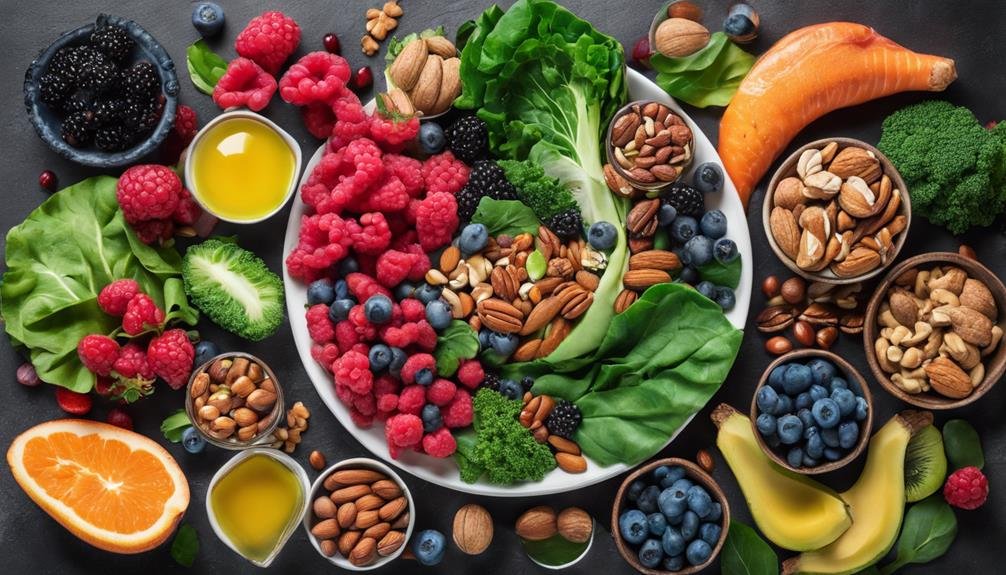
To understand the link between inflammation and cancer risk, it's crucial to recognize that chronic inflammation is a known factor that can contribute to the development and progression of various types of cancer. When your body experiences inflammation over a long period, it can lead to DNA damage, increased cell proliferation, and decreased cell death, all of which are factors that can promote cancer formation.
Inflammation triggers the release of certain molecules that can damage cells and tissues, creating an environment that's conducive to cancer growth. Additionally, chronic inflammation can weaken the immune system's ability to identify and destroy cancer cells, further increasing cancer risk.
Therefore, reducing inflammation in your body through dietary choices and lifestyle habits is essential for lowering your risk of developing cancer. By adopting a whole-food Paleo diet rich in anti-inflammatory foods, you can help decrease chronic inflammation and support your body in maintaining optimal health and reducing the risk of cancer.
Nutrient-Dense Foods for Prevention
As we focus on ways to lower inflammation and reduce cancer risk through dietary choices, turning to a diet rich in nutrient-dense foods becomes a key strategy. Nutrient-dense foods are crucial for providing essential vitamins, minerals, and antioxidants that support overall health and may help in cancer prevention.
Here are some nutrient-dense foods to consider adding to your diet:
- Leafy Greens: Spinach, kale, and Swiss chard are packed with vitamins A, C, and K, as well as minerals like iron and calcium.
- Berries: Blueberries, strawberries, and raspberries are rich in antioxidants like anthocyanins, which may help protect cells from damage.
- Fatty Fish: Salmon, mackerel, and sardines are excellent sources of omega-3 fatty acids, known for their anti-inflammatory properties.
- Nuts and Seeds: Almonds, chia seeds, and flaxseeds are good sources of healthy fats, fiber, and antioxidants that support overall health.
Impact of Processed Sugars
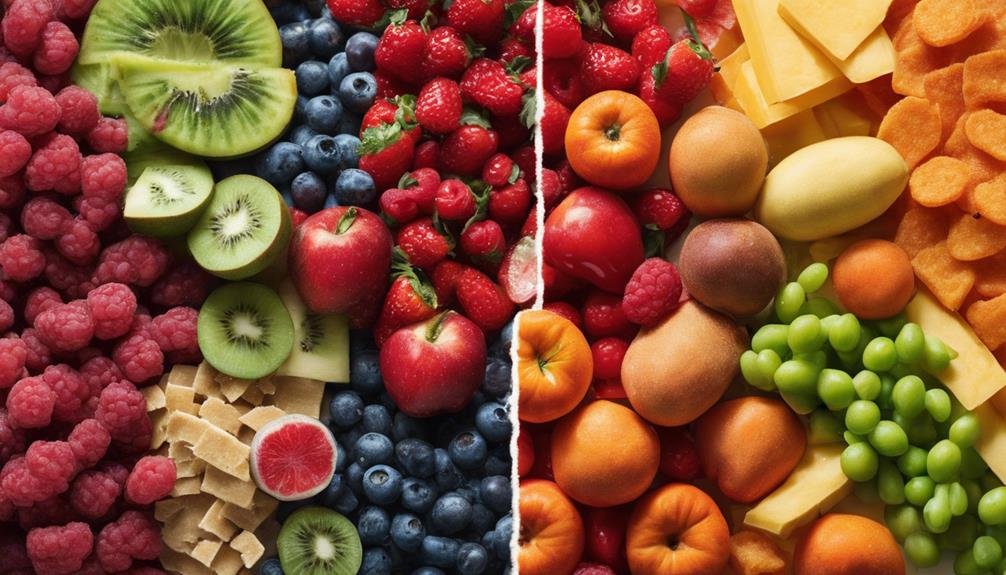
Processed sugars have a significant impact on overall health, particularly when it comes to increasing inflammation and potentially raising the risk of cancer. When you consume foods high in processed sugars, such as sugary drinks, desserts, and snacks, your body experiences a spike in blood sugar levels, leading to increased inflammation. Chronic inflammation is linked to various health issues, including cancer. Additionally, processed sugars can contribute to weight gain and obesity, which are known risk factors for certain types of cancer.
To reduce your intake of processed sugars and lower your cancer risk, focus on whole, nutrient-dense foods like fruits, vegetables, lean proteins, and healthy fats. Opt for natural sweeteners like honey or maple syrup in moderation instead of refined sugars. Be mindful of food labels and choose products with minimal added sugars.
Grains and Cancer Connection
When considering the connection between grains and cancer, it's crucial to understand how your dietary choices can impact your risk of developing this disease. Grains, a staple in many diets, can have both positive and negative effects on health. Here are some key points to consider:
- Whole Grains vs. Refined Grains: Opt for whole grains like quinoa, brown rice, and oats, as they contain fiber and nutrients that may help reduce cancer risk.
- Gluten Sensitivity: Some individuals may have gluten sensitivities that can lead to inflammation, potentially increasing cancer risk.
- Glycemic Index: High-glycemic index grains can cause spikes in blood sugar levels, which may promote cancer cell growth.
- Mycotoxins: Grains can be susceptible to mold contamination, leading to mycotoxin exposure, which has been linked to cancer development.
Immune System Support
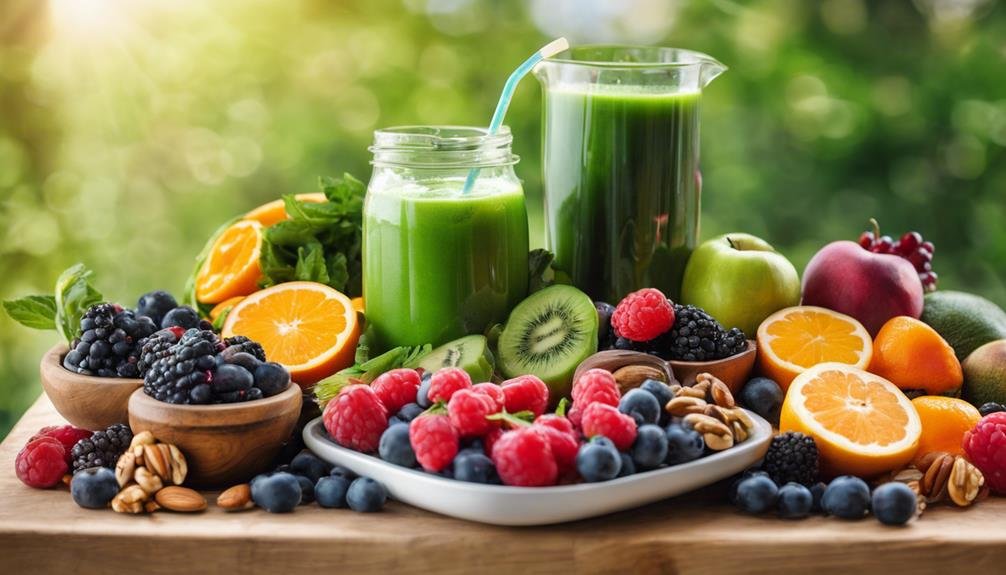
To bolster your body's natural defenses against cancer, focusing on supporting your immune system is paramount. Your immune system plays a crucial role in identifying and eliminating abnormal cells that could potentially lead to cancer.
A whole-food Paleo diet rich in fruits, vegetables, lean proteins, and healthy fats can provide the necessary nutrients to keep your immune system strong and functioning optimally.
Incorporating foods like citrus fruits, bell peppers, garlic, ginger, turmeric, and green tea can provide your body with essential vitamins, minerals, and antioxidants that support immune function. Additionally, including probiotic-rich foods like sauerkraut, yogurt, and kefir can promote a healthy gut microbiome, which is closely linked to immune health.
Regular physical activity, stress management techniques, and adequate sleep are also vital components of immune system support. By maintaining a balanced lifestyle and nourishing your body with nutrient-dense foods, you can empower your immune system to defend against cancer and other diseases effectively.
Phytonutrients and Antioxidants
Supporting your body's defense against cancer involves harnessing the power of phytonutrients and antioxidants found in a whole-food Paleo diet. These compounds play a crucial role in protecting your cells from damage and inflammation, ultimately reducing the risk of cancer development.
Here are some key phytonutrients and antioxidants that can benefit your health:
- Curcumin: Found in turmeric, curcumin has potent anti-inflammatory and antioxidant properties that may help inhibit cancer cell growth.
- Resveratrol: Found in foods like grapes and berries, resveratrol is known for its antioxidant effects that can protect cells from damage.
- Quercetin: Present in foods like onions and apples, quercetin has been linked to anti-cancer effects due to its ability to neutralize free radicals.
- Lycopene: Abundant in tomatoes, lycopene is a powerful antioxidant that may help reduce the risk of certain cancers, particularly prostate cancer.
Incorporating these phytonutrients and antioxidants into your diet through whole foods can be a delicious and proactive step towards cancer prevention.
Gut Health and Cancer Prevention
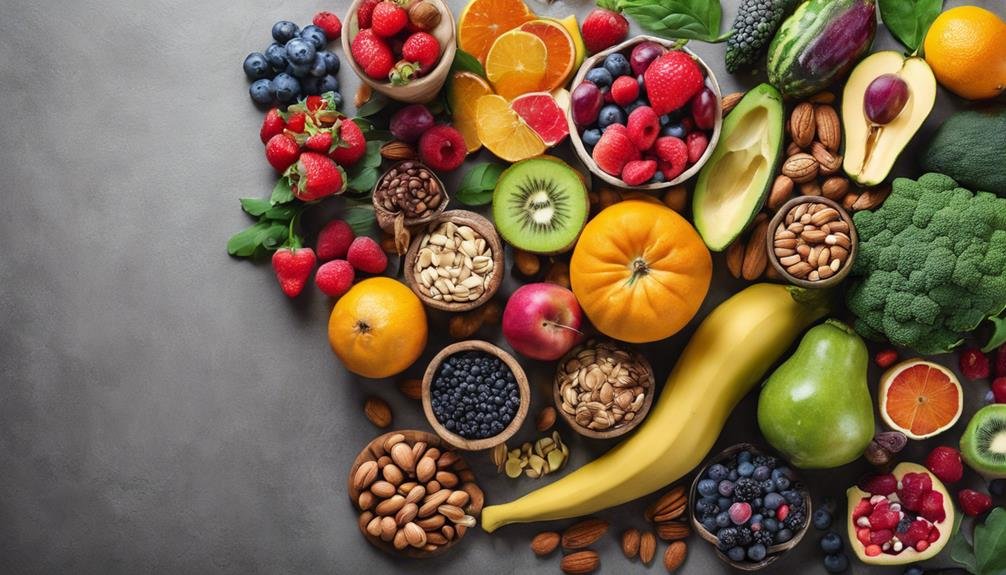
Enhancing gut health is a fundamental aspect of cancer prevention that can significantly impact your overall well-being. Your gut plays a crucial role in maintaining a healthy immune system and protecting your body from harmful pathogens, including cancer-causing agents.
A whole-food Paleo diet rich in fiber, fruits, vegetables, and fermented foods can promote a diverse and thriving gut microbiome, which is essential for reducing inflammation and preventing cancer development.
Research suggests that a balanced gut microbiota can enhance your body's ability to eliminate toxins, regulate inflammation, and support overall health. By consuming probiotic-rich foods like sauerkraut, kefir, and kimchi, you can introduce beneficial bacteria into your gut, strengthening its defenses against cancer.
Furthermore, avoiding processed foods, excess sugar, and artificial additives can help maintain a healthy gut environment. Prioritizing whole, nutrient-dense foods can nourish your gut microbiome and reduce the risk of inflammation and oxidative stress, both of which are linked to cancer development.
Hormonal Balance and Risk
Maintaining hormonal balance is a critical factor in assessing the risk of developing cancer. Hormones play a significant role in regulating various bodily functions, and imbalances can potentially increase cancer risk. Here are some key points to consider:
- Estrogen Levels: High levels of estrogen have been linked to an increased risk of breast and uterine cancers. Maintaining a healthy balance of estrogen is crucial for cancer prevention.
- Insulin Resistance: Insulin resistance, often associated with high sugar and refined carbohydrate diets, can lead to elevated insulin levels, which may promote cancer growth. Adopting a whole-food Paleo diet can help improve insulin sensitivity.
- Thyroid Function: Thyroid hormones influence metabolism and cell growth. Disrupted thyroid function can impact cancer risk. Consuming nutrient-dense foods can support thyroid health.
- Cortisol Regulation: Chronic stress can elevate cortisol levels, which may contribute to inflammation and cell damage linked to cancer development. Implementing stress-reducing practices and consuming anti-inflammatory foods can help maintain healthy cortisol levels.
Exercise and Lifestyle Factors
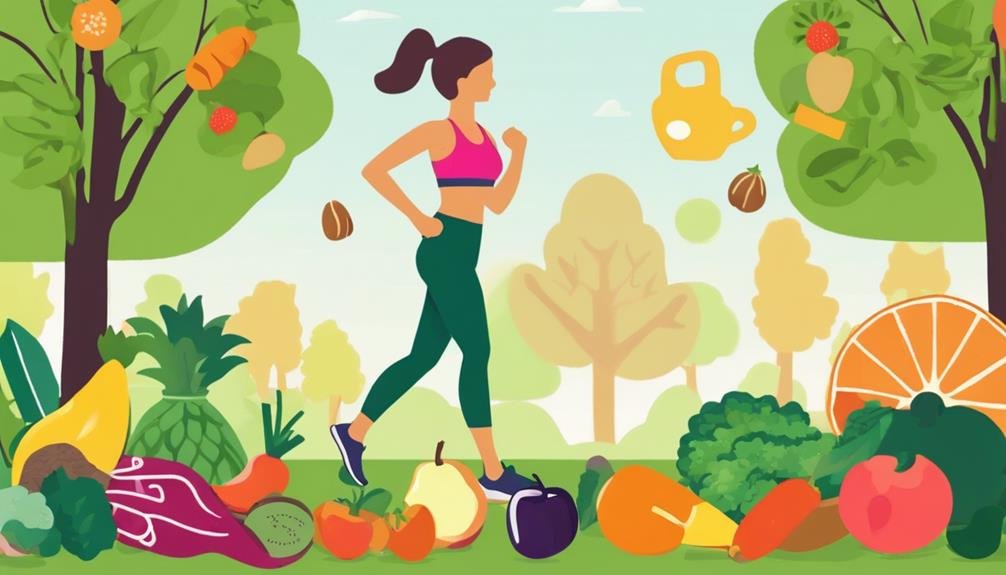
To optimize cancer prevention, incorporating regular physical activity and adopting healthy lifestyle habits are essential components. Engaging in at least 150 minutes of moderate-intensity exercise per week can significantly reduce the risk of various types of cancer. Activities like brisk walking, swimming, or cycling not only help maintain a healthy weight but also boost the immune system and promote overall well-being.
Additionally, avoiding tobacco and limiting alcohol consumption are crucial lifestyle factors in cancer prevention. Smoking has been linked to a multitude of cancers, including lung, throat, and bladder cancer, while excessive alcohol intake can increase the risk of breast, liver, and colorectal cancer.
Ensuring an adequate intake of fruits, vegetables, whole grains, and lean proteins, along with staying hydrated and managing stress levels, further supports a holistic approach to cancer prevention. By prioritizing regular exercise and adopting healthy lifestyle habits, you can significantly reduce your risk of developing cancer and promote long-term well-being.
Implementing a Whole-Food Paleo Diet
For optimal health and disease prevention, incorporating a whole-food Paleo diet can be a beneficial approach. When implementing this diet, consider the following:
- Focus on Whole Foods: Prioritize consuming lean meats, fish, eggs, fruits, vegetables, nuts, and seeds while avoiding processed foods.
- Eliminate Processed Sugar and Grains: Cut out refined sugars and grains as they can contribute to inflammation and other health issues.
- Embrace Healthy Fats: Include sources of healthy fats like avocados, olive oil, and nuts to support brain health and overall well-being.
- Stay Hydrated: Drink plenty of water throughout the day to help with digestion, nutrient absorption, and overall health.
Frequently Asked Questions
Can a Paleo Diet Prevent All Types of Cancer?
A paleo diet, while beneficial for many aspects of health, can't guarantee prevention of all types of cancer. Research suggests that a diet rich in whole foods like fruits, vegetables, and lean proteins can lower cancer risk, but various factors contribute to cancer development. Incorporating a paleo diet as part of a healthy lifestyle may reduce risk factors, but it's essential to consult with healthcare professionals for a comprehensive approach to cancer prevention.
How Does Alcohol Consumption Affect Cancer Risk on a Paleo Diet?
Alcohol consumption can increase cancer risk on a paleo diet. Research shows that even moderate alcohol intake can elevate the chances of developing various types of cancer, such as breast, liver, and esophageal cancer. When following a paleo diet for cancer prevention, it's crucial to limit or avoid alcohol consumption to lower the risk of cancer development. Prioritizing whole foods and healthy lifestyle choices can significantly impact cancer prevention efforts.
Are There Specific Herbs or Spices That Can Help Prevent Cancer?
When it comes to preventing cancer, incorporating certain herbs and spices into your diet can be beneficial.
Turmeric, garlic, ginger, and green tea are known for their potential cancer-fighting properties. These ingredients contain antioxidants and anti-inflammatory compounds that may help reduce the risk of cancer development.
Adding these flavorful elements to your meals can't only enhance the taste but also contribute to your overall health and well-being.
Can Intermittent Fasting Complement a Whole-Food Paleo Diet for Cancer Prevention?
Intermittent fasting can be a useful complement to a whole-food paleo diet for various health benefits, including cancer prevention. By incorporating periods of fasting, you may enhance cellular repair processes and improve metabolic health, which can be advantageous in reducing cancer risks.
However, it's important to consult with a healthcare provider before making any significant dietary changes, especially if you have existing health conditions or concerns.
Are There Any Potential Drawbacks to Following a Whole-Food Paleo Diet for Cancer Prevention?
When following a whole-food paleo diet for cancer prevention, potential drawbacks may include limited intake of certain nutrients found in grains and dairy. To address this, focus on obtaining essential vitamins and minerals from alternative sources like leafy greens, nuts, and seeds.
It's also crucial to ensure adequate fiber intake through fruits and vegetables to support gut health. Consulting a healthcare provider or nutritionist can help optimize your diet for overall well-being.
Conclusion
In conclusion, adopting a whole-food Paleo diet can serve as a powerful shield against cancer, providing your body with the essential nutrients and antioxidants needed to combat disease. By nourishing yourself with lean meats, fish, fruits, vegetables, nuts, and seeds, while steering clear of processed sugars and dairy, you are taking proactive steps towards a healthier, cancer-resistant future. Embrace this ancestral-inspired way of eating to thrive and protect your well-being.
